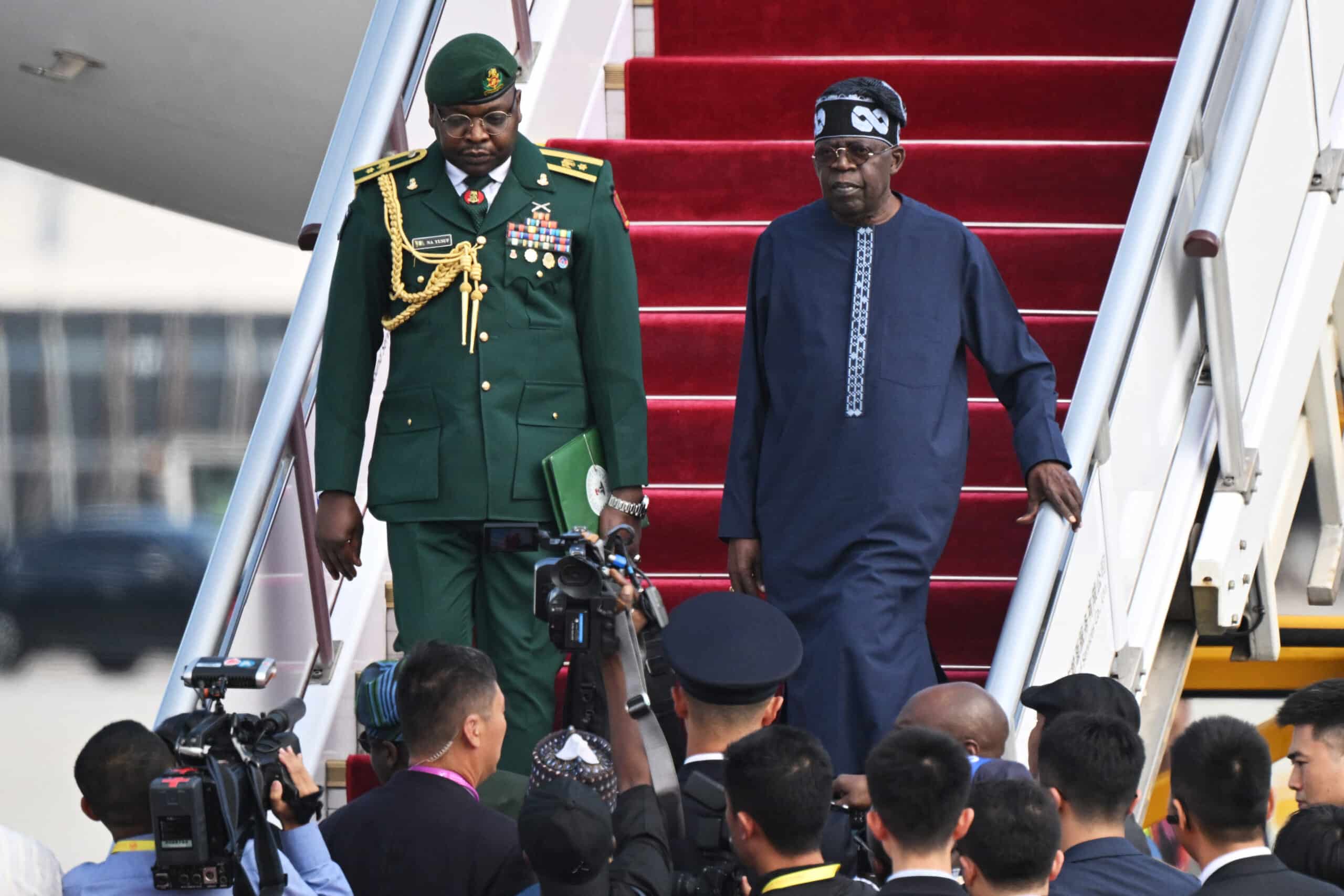
Nigerias President Bola Ahmed Tinubu (R) arrives at Beijing Capital Airport forward of the Discussion board on China-Africa Cooperation (FOCAC), on September 1, 2024. (Photograph by Greg Baker / POOL / AFP)
Lagos, Nigeria — Weeks of gasoline scarcities in Nigeria are compounding a cost-of-living disaster, with the state-run oil firm acknowledging “monetary pressure” was hampering provides.
Olufemi Soneye, a spokesman for government-controlled Nigerian Nationwide Petroleum Firm Restricted (NNPCL), blamed the lingering shortage on monetary points, in an announcement on the weekend.
Nigeria, a serious African oil producer, usually sees sporadic gasoline shortages that trigger lengthy traces at NNPCL-run petrol stations that promote gasoline at cheaper costs than non-public operators.
READ: Nigeria eyes $1.3 billion bundle to fight hovering costs
“This monetary pressure has positioned appreciable strain on the corporate and poses a menace to the sustainability of gasoline provide,” Soneye stated within the assertion.
Article continues after this commercial
It comes after NNPCL declared a report revenue of three.3 trillion naira (about $2 billion) final month and an preliminary public denial of its enormous debt burden.
Article continues after this commercial
In addition to autos, most households in Nigeria depend on petrol and diesel to energy their turbines as the general public energy provide is unreliable and vulnerable to blackouts.
Although an OPEC oil producer, Nigeria imports most of its gasoline wants as a result of it has little or no working refining capability.
Africa’s most populous nation is already struggling beneath greater dwelling prices after authorities reforms to finish a gasoline subsidy and free the naira foreign money drove a spike in inflation.
“The gasoline shortage is de facto exhausting,” Ismael Abdullai, 36, a supply bike rider for a meals supply firm, advised AFP. “We glance, however you at all times need to look tougher to see gasoline.”
Gas scarcities have been extra frequent since President Bola Tinubu eliminated the expensive gasoline subsidies that noticed the federal government pay billions of {dollars} a yr to maintain the value of petrol artificially low.
Its worth has since greater than tripled in some states, with a knock-on impact on meals and transport prices.
“The price of transportation is now very excessive as a result of hike within the worth of gasoline,” a video editor Hogan Samuel advised AFP.
“I spent 1,100 naira ($0.70) to get to the workplace this morning as a substitute of the same old 750 naira.”
‘Lengthy queues’
Many stations had been shuttered on Monday morning in elements of the industrial capital Lagos. Lengthy traces fashioned at those who had been promoting, inflicting site visitors jams.
“We might queue from 6:00 am and nonetheless not get gasoline till 12:00 or 1:00 pm or 2:00 pm,” Sola Adewusi, a 36-year-old non-public driver advised AFP. “It’s due to our leaders, they’re unhealthy.”
Drivers seeking to save as a lot as 15,000 naira on a full tank kind longer queues at NNPC filling stations the place it’s offered on the least expensive fee of 560 naira for a litre. Nevertheless it goes for as a lot as 950 naira elsewhere.
“Most of us like to purchase at NNPC due to the distinction within the worth between the NNPC and the non-public fuelling stations,” Abdullai stated.
The junior oil minister Heineken Lokpobiri advised an vitality labour summit in Nigeria’s capital Abuja final week that NNPCL wanted to hike the value of petrol it sells to unbiased entrepreneurs, claiming that the present worth of 600 naira was fuelling the smuggling of the product in a foreign country.
“The state of affairs doesn’t make us comfortable,” a painter Uzochukwu Christian advised AFP in Abuja. “Authorities ought to assist us.”

